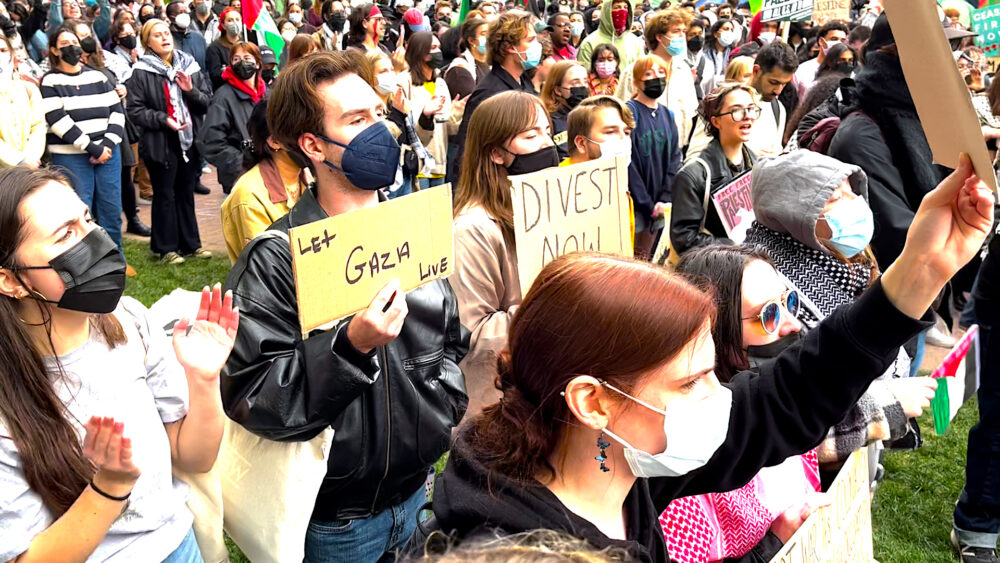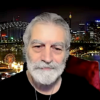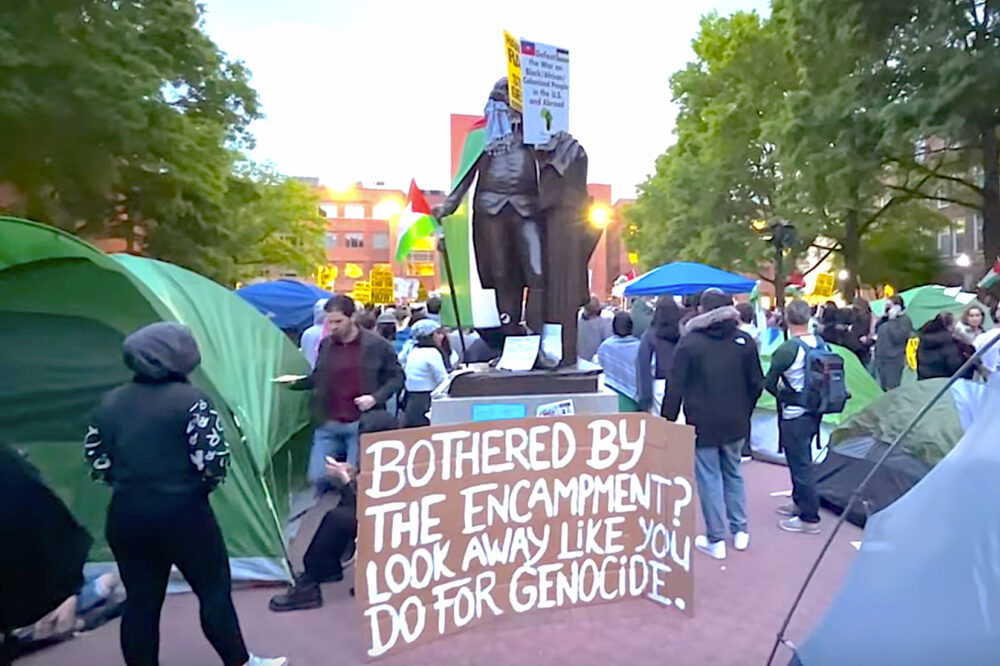The GWU administration had given the students until 7 p.m. Thursday to vacate the yard. They refused and were continuing their protest on Friday, reports Joe Lauria.
By Joe Lauria
in Washington, D.C.
Special to Consortium News
Hundreds of students at George Washington University (GWU) in Washington D.C. are defying a university curfew and the fear of police intervention to continue their anti-genocide protest on Friday.
The protesters, who have set up a tent encampment in the university yard, were joined by at least one thousand students from other Washington area campuses and other supporters to protect them on Thursday night.
The GWU administration had given the students until 7 p.m. to vacate the yard. They refused and were continuing their protest on Friday. [Watch this live feed of the protest on X from Reuters.]
Campus police at Columbia University in New York; Yale University in New Haven, Connecticut; the University of Texas at Austin; Emory University in Atlanta and the University of Southern California in Los Angeles have since last week broken up similar encampments, arrested students and faculty for exercising their rights to speak out against the ongoing genocide in Gaza and refused to allow many of them back on campus.
At Princeton University in New Jersey on Thursday, Pulitzer Prize-winning journalist Chris Hedges was stopped by campus police from reading a poem to the children of Gaza.
The harsher the tactics against the protests, the larger the protests are growing, drawing comparisons to American campus anti-war protests during the Vietnam War era.
Another comparison was drawn, to anti-Jewish protests on German university campuses in the 1930s, by Israeli Prime Minister Benjamin Netanyahu in one of the most brazen and cynical speeches a foreign leader could make about protected American speech.
In the midst of his government perpetrating a genocide he demanded a harder crackdown on U.S. university students, whom he called “anti-semtic mobs.” He falsely said they called for the “annihilation” of Israel. “It’s unconscionable, it has to be stopped,” he said to an audience that includes U.S. authorities who believe him and act on his words.
“Netanyahu had the audacity to call this student uprising ‘horrific,'” said one student at GWU. “What is horrific is the mass grave discovered with over 342 bodies that had been mutilated beyond recognition. That’s horrific. Children were buried [at al Shifa Hospital] with their hands behind their back. That’s horrific. Patients with catheters still inside their bodies. That is horrific.”
Please watch this powerful 57 min. film (and its ending) of GWU students protesting against genocide in Gaza, including an interview with Medea Benjamin, co-founder of Code Pink; fiery speeches and a condemnation of Netanyahu’s remarks as the students awaited the police. As of 3 p.m. on Friday EDT, the protest was still going.
“What kind of system do we live in where an institution can call the police on you for opposing genocide, but there’s no authority you can call on an institution that supports genocide?” activist Sean Blackman asked the crowd.
(Reporting and camera: Joe Lauria. Editor: Cathy Vogan.)
Joe Lauria is editor-in-chief of Consortium News and a former U.N. correspondent for The Wall Street Journal, Boston Globe, and other newspapers, including The Montreal Gazette, the London Daily Mail and The Star of Johannesburg. He was an investigative reporter for the Sunday Times of London, a financial reporter for Bloomberg News and began his professional work as a 19-year old stringer for The New York Times. He is the author of two books, A Political Odyssey, with Sen. Mike Gravel, foreword by Daniel Ellsberg; and How I Lost By Hillary Clinton, foreword by Julian Assange. He can be reached at joelauria@consortiumnews.com and followed on Twitter @unjoe




Thanks Paula, I just cannot comprehend that genocide is acceptable to our leaders and authorities while the hurt feelings of certain people at the criticism of the perpetrators are given priority and are used as a pretext for arrests and expulsions of students.
Listening to this podcast of the history of Israeli treatment of the Palestinians (link below), I didn’t think there could be anything more awful than the history of Belgium’s colonization of the Congo, or a story worse than that of the hanging of a black man in the South, whose pregnant wife came to defend him and they hung her too and cut her unborn child from her belly and stomped it to death. USA history, both the known and unknown is very similar to Israel and the Belgian Congo.
Concerning Israel, I am certain Conrad could have written Heart of Darkness II. Any nation that claims democracy and human rights and yet at the same time supports the continued atrocities that humans can and have inflicted on one another like no animal has ever done, is not even worthy of the title of animal. The mass murder of the Palestinians exposes the river of lies this country has told us, and the lies of other nations as well which instead of being life giving water, is actually a river of lies full of the blood of humanity.
I have grown unbelievably old and without hope witnessing this genocide, as its approval by the collective west portends what lies in store for the rest of humanity.
hxxps://www.usefulidiotspodcast.com/p/this-book-debunks-everything-netanyahu
I cannot say what happened to the students of Kent State, why National Guard opened fire for protesting a war, or the assault on Occupy Wall Street Movement, and now youth across the nation and other nations saying NO to genocide, and the interests involved in its continuation calling a protest against genocide antisemitic. The truth no one speaks but Michael Hudson in his article, The Truth About the Destruction of Gaza which clearly indicates why the collective West supports this “in our faces genocide”, is that the hegemony of the collective West is being challenged and Israel is what will happen to anyone who denies the hegemon its first place in the world.
The attack on peaceful students protests, like the peaceful protests in Gaza, will be met by the controlled force of the US government, whose immoral and unethical support of genocide is not it’s first and we can only hope, with the aid of these beautiful students and others who can see this nation’s governance for what it is, and not be killed but live long enough to bring and not lose along the way, their morals and ethics that led them to protest a genocide. If you can see far enough ahead, this genocidal behavior is expected to “desensitize” us to such, which means the behavior is coming for more than just Palestinians and why it is so important to stop it ASAP.I I think the students “feel” this even if unartiulated. What happens to one can happen to all especially in a government no longer controlled by or for the people. Here’s some factual history about Israel and why I think it should not exist. However, USA is not much better; only better at hiding their atrocities from the US population until Juliann exposed them as have others.